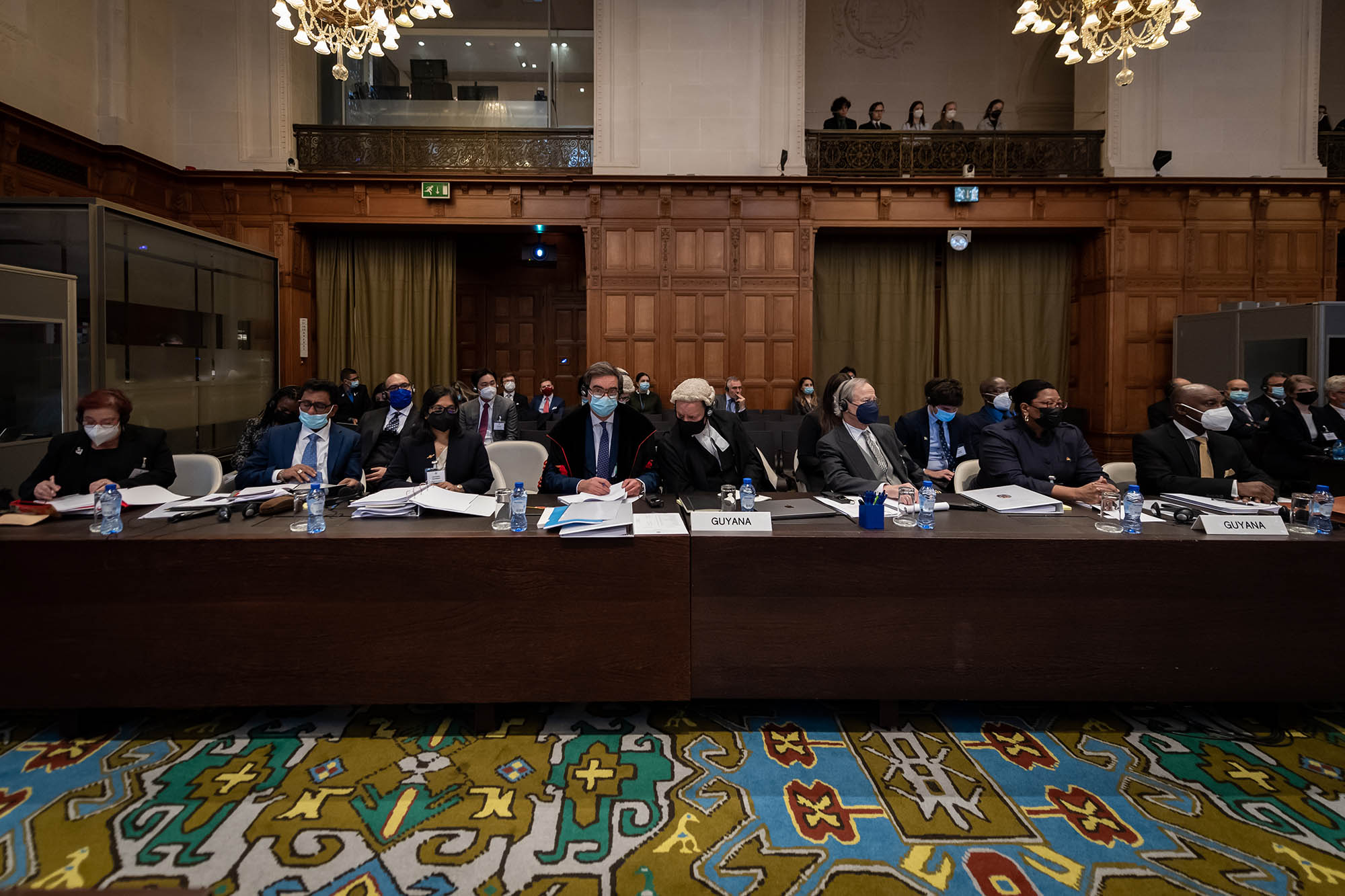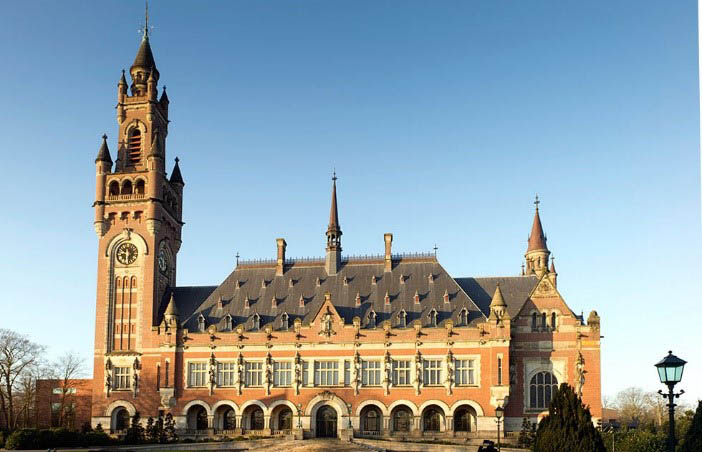Accusing the United Kingdom of being a “land grabber”, Venezuela yesterday made preliminary objections to Guyana’s application before the International Court of Justice (ICJ) to have the 1899 Arbitral Agreement settling the boundary between the two countries confirmed as valid and binding.
Appearing before the court in the Hague, the Netherlands, Venezuela’s Executive Vice President Delcy Rodriguez said Caracas was not disputing the jurisdiction of the ICJ to adjudicate the border controversy between itself and Guyana but instead has an issue with the claim being brought before the Court by Georgetown which it argues is in the first place not the proper party to even bring such a claim before the Court.
Contending that Guyana has no standing in the matter which does not concern it, Venezuela says it is the United Kingdom (UK) instead which it calls a “land grabber,” and accuses of “fraud” and a “cover-up” in the Arbitral Award of 3rd October 1899 by which the territory was “given” to Guyana.

Against that background, Venezuela is calling for the case brought by Guyana which it accuses of being driven by its new-found oil wealth from the many discoveries being unearthed here; to be dismissed.
Rodriguez presented Venezuela as being the “sole indisputable inheritor” of the territory in question.
She said that the application requesting the Court to adjudicate on the validity of the 1899 arbitral award, was filed unilaterally by Guyana but that the reason the Geneva Agreement was signed in 1966 was that of “seeking (a) satisfactory solution for the practical (resolution) of the controversy between Venezuela and the United Kingdom” which she said had arisen as a result of Venezuela’s contention that the arbitral award of 1899 was null and void.
She told the Court during the public hearings yesterday that on the contrary, the United Kingdom and Venezuela reached an agreement which expressly stated that the Geneva Agreement was an “agreement to resolve the controversy between Venezuela and the United Kingdom.”
Against this background she said it cannot be understood how Guyana now intends the escape from this commitment.

Furthermore, she said that the application has been filed against Venezuela “by someone who did not participate in the `fraud’ of 1899, and that even though Guyana, together with the United Kingdom recognizes the Geneva Agreement of 1966.
She said that Guyana’s interpretation of the Geneva Agreement affects the right of the Venezuelan people and vital interest of Venezuela and its territorial integrity.
Rodriguez then went on to say that for this reason, Venezuela, in compliance with its constitutional duty and in accordance with international law, filed preliminary objections to the admissibility of Guyana’s application before the Court and appears in this phase to note that the Court should not admit Guyana’s application.
“We submit that this Court would not be in a position to resolve Guyana’s application,” she said because the United Kingdom, being the indispensable party to settle such a matter of the dispute is not participating.
Placing her country’s case in what she said is its “historical and factual” perspective Rodriguez said that in 1777 the provinces of Venezuela were created, referencing a map which was projected during the hearing and where she sought to point out the Essequibo area as belonging to Venezuela.
She said that in 1925, the UK recognized Gran Colombia which she claimed had as its eastern boundary, Guyana’s Essequibo.
In her impassioned address, Rodriguez said that through the 19th century, the British government sought to unilaterally assert new land rights by publishing what she said were “doctored maps,” claiming “falsified” border lines in its favour.
According to her, “all the pieces were arranged to give way to a fraud to deception. In the end, the United Kingdom would steal the Venezuelan territory for political and economic reasons.”
She said that there are two protagonists which she said are the colonialist power of the United Kingdom which she described as the “land grabber” and Venezuela which she said is the victim; adding that after Venezuela discovered the fraud of the arbitral award of 1899, it denounced the situation within the United Nations General Assembly in 1962.
She then went on to assert that in direct connection with arbitration fraud, it is now beginning to be revealed “how the United Kingdom acted disloyally, lying during the formulation of the Geneva Agreement” and signing a commitment to reaching an amicable and practical (resolution).
According to Rodriguez, what the United Kingdom did in reality, was cover up its improper behaviour which she said is evidenced by a note on the 9th November, 1963 from the British Embassy in Caracas to the Foreign office in London.
“Madam President, this Court has found that it has jurisdiction to examine the validity of the award,” but she questioned, how could the court do this without the participation of the United Kingdom.
She went on to ask, “How would the determination of the validity or nullity of the award be reached without the main actor—the United Kingdom.”
She then said that Guyana, in arriving at what she called its unilateral application before the Court, was moved to so do, at the beginning of 2015, when the entire relationship changed in the search for an amicable resolution.
She then went on to reason that in 2015, the American Oil Company, ExxonMobil announced, a “world famous discovery,” and that it was in the same year that Guyana forgot about the UN Good Offices process and abandoned bilateral negotiations.
Guyana she said, began an oil adventure by unilaterally granting large concessions to transnational companies which Venezuela has protested; while accusing Guyana of taking its “illegal” prospecting, going so far as to make incursions into undisputed territorial waters of Venezuela.
Rodriguez remained adamant that in the absence of this indispensable party—the United Kingdom—the Court must declare Guyana’s application inadmissible.
Guyana will be presenting its response today.
Though initially signaling its non-participation in the proceedings, owing to its position that the Court lacked jurisdiction to hear the case, Venezuela in a U-turn, moved to challenge the ruling by the Court made in December of 2020 that it did have jurisdiction; stating that Guyana has no locus standi (standing) in the matter before it as its application is not admissible.
Back in March of this year, Guyana submitted its Memorial on the merits of its case. Three months later, Venezuela filed preliminary objections to the admissibility of Guyana’s case before the Court.
Background
In March 2018, Guyana filed its application with the ICJ to confirm the validity and binding effect of the Arbitral Award of 1899 on the boundary between the two countries and the subsequent 1905 agreement, following the decision by the UN Secretary-General Antonio Guterres to choose the ICJ as the next means of resolving the controversy which stems from Venezuela’s contention that the award was null and void.
In its Application of March 29 before the ICJ, Guyana requested that the Court adjudge and declare that:
“(a) The 1899 Award is valid and binding upon Guyana and Venezuela, and the boundary established by that Award and the 1905 Agreement is valid and binding upon Guyana and Venezuela;
(b) Guyana enjoys full sovereignty over the territory between the Essequibo River and the boundary established by the 1899 Award and the 1905 Agreement, and Venezuela enjoys full sovereignty over the territory west of that boundary; Guyana and Venezuela are under an obligation to fully respect each other’s sovereignty and territorial integrity in accordance with the boundary established by the 1899 Award and the 1905 Agreement;
(c) Venezuela shall immediately withdraw from and cease its occupation of the eastern half of the Island of Ankoko, and each and every other territory which is recognized as Guyana’s sovereign territory in accordance with the 1899 Award and 1905 Agreement;
(d) Venezuela shall refrain from threatening or using force against any person and/or company licensed by Guyana or engage in economic or commercial activity in Guyanese territory as determined by the 1899 Award and 1905 Agreement, or in any maritime areas appurtenant to such territory over which Guyana has sovereignty or exercises sovereign rights, and shall not interfere with any Guyanese or Guyanese-authorised activities in those areas;
(e) Venezuela is internationally responsible for violations of Guyana’s sovereignty and sovereign rights, and for all injuries suffered by Guyana as a consequence.”
Guyana’s recourse to the ICJ came after decades of stalemate in its border controversy with Venezuela. While Venezuela had said it was not participating in the process, it was a part of the initial case management process. Its Vice President Rodríguez had told the ICJ that her country’s participation was “as a courtesy, not as a party in this procedure.”
In March of this year, Guyana submitted its Memorial on the Merits of its border controversy Case against Venezuela – as required by the Court following its decision of 18 December 2020 confirming its jurisdiction to decide the merits of Guyana’s claims.
“Guyana seeks from the Court a decision that the Arbitral Award of 1899 determining the boundary is valid and binding upon Guyana and Venezuela, and that the boundary established by that Award and the 1905 Agreement demarcating it, is the lawful boundary between Guyana and Venezuela. The Court has agreed in its earlier decision that it has jurisdiction to do so. Guyana now looks to the Court’s judicial process and its settlement of the matter under the rule of law”, the Ministry of Foreign Affairs had said in a statement following the submission.
Guyana is represented in the case before the Court by the following counsel:
Sir Shridath Ramphal, OE, OCC, KC, Co-Agent and Counsel
Paul S. Reichler, Attorney-at-Law, Foley Hoag LLP, member of the Bars of the United States Supreme Court and the District of Columbia;
Alain Pellet, Professor Emeritus of the University Paris Nanterre, former Chairman of the International Law Commission, member of the Institut de droit international;
Professor Philippe Sands KC, Professor of International Law at University College London;
Payam Akhavan, LLM, SJD (Harvard University), Professor of International Law, Senior Fellow, Massey College, University, of Toronto, member of the Bar of New York and the Law Society of Ontario, member of the Permanent Court of Arbitration;
Professor Pierre d’Argent, Professor ordinaire, Université Catholique de Louvain, member of the Institut de Droit International, Foley Hoag LLP, member of the Bar of Brussels;
Christina L. Beharry, Foley Hoag LLP, member of the Bars of the District of Columbia, the State of New York, England and Wales, and the Law Society of Ontario;
Edward Craven, Barrister, Matrix Chambers, London;
Juan Pablo Hugues Arthur, Foley Hoag LLP, member of the Bar of the State of New York;
Isabella F. Uria, Attorney–at-Law, Foley Hoag LLP, member of the Bar of the District of Columbia.
Meanwhile; representing Guyana at the hearings are: Attorney General Anil Nandlall, S.C; Minister of Parliamentary Affairs and Governance Gail Teixeira; Agent of Guyana in the case Carl Greenidge; Ambassador Elisabeth Harper, Co-Agent and Permanent Secretary of the Ministry of Foreign Affairs; Director of the Frontiers Department of the Ministry of Foreign Affairs Donnette Streete and Advisor to the Leader of the Opposition on Frontier matters, Ambassador Ronald Austin.
Delcy Rodriguez making her presentation yesterday (ICJ photo)
The Guyana team at the hearing yesterday (ICJ photo)





